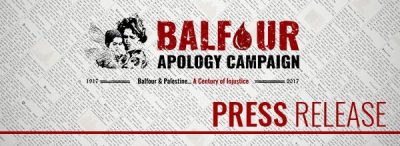On Eve of 103rd Anniversary of Balfour Pledge, Palestinian Refugees Still Committed to Unyielding Right of Return

More than a century on, millions of Palestinian refugees continue to grapple with the devastating upshots of the Balfour Declaration, which led to a significant upheaval in the lives of Palestinians.
Issued on November 2, 1917, the declaration turned the Zionist aim of establishing a Jewish state in Palestine into a reality when Britain publicly pledged to establish “a national home for the Jewish people” there.
The pledge came in the form of a letter from Britain’s then-foreign secretary, Arthur Balfour, addressed to Lionel Walter Rothschild, a figurehead of the British Jewish community.
Though the Balfour Declaration included the admonition that “nothing shall be done which may prejudice the civil and religious rights of existing non-Jewish communities in Palestine”, the British mandate was set up in a way to equip Jews with the tools to establish self-rule, at the expense of the Palestinian Arabs.
The efforts made by the London-based Palestinian Return Centre (PRC) in this regard have been on the go over recent years to urge Britain to apologize to the Palestinians for the tragedy that has befallen them as a result of the Balfour Declaration.
The Balfour Apology Campaign (BAC), kick-started by PRC some seven years ago, falls within the above context as it matches ongoing endeavors to hold Britain historically, morally, and politically accountable for the dispossession and displacement of 750,000 civilians from their own and only homeland—Palestine—to give way for the establishment of the self-proclaimed state of Israel.
As a result, nearly 7 million Palestine refugees have become scattered all over the world, torn from the nourishment of home and the warmth of family.
Reaching out to a plethora of British and EU diplomats and MPs, PRC has been striving to mobilize worldwide support for the campaign and communicate its demands to official bodies, mainly the British government. Contacts have been held around the clock with NGOs, youth movements, and student events to that very end.
In 2017, an e-petition headed up by PRC and launched on the official website of the British Parliament, attracted fewer than 14,000 signatures by British nationals. Duty-bound to respond to the petition, after it managed to pass the benchmark for an official response, the never-sorry government responded 10 days later, only to confirm that it will not extend any apology over the Balfour pledge.
“The Balfour Declaration is an historic statement for which HMG does not intend to apologize,” the government said at the time. “We are proud of our role in creating the State of Israel. The task now is to encourage moves towards peace.”
A spokesperson said the Declaration was written in a world of “competing imperial powers” as the First World War raged and Ottoman Empire diminished, claiming: “In that context, establishing a homeland for the Jewish people in the land to which they had such strong historical and religious ties was the right and moral thing to do, particularly against the background of centuries of persecution.”
Yet, the Government’s statement accepted that the Declaration “should have called for the protection of political rights of the non-Jewish communities in Palestine, particularly their right to self-determination” but said that lasting peace must now be established through a two-state solution.
The response sparked universal condemnation, with activists and NGOs dubbing it as a sign of Britain’s failure to pay heed to the horrendous crimes committed by Zionist gangs who crept into Palestine during the British Mandate and embarked on systematic massacres and ethnic genocides that brought about the displacement of millions of Palestinians from over 570,000 Palestinian villages in 1948.
As BAC campaigners sought to pass the 100,000 yardstick for a parliament discussion, the parliamentary follow-up committee abruptly altered the cut-off date, reducing it from six months to two months and a half only under the guise that snap elections had been called.
*
Note to readers: please click the share buttons above or below. Forward this article to your email lists. Crosspost on your blog site, internet forums. etc.
Featured image is from PRC

